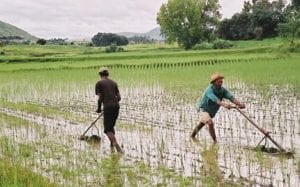Ugandan farmers are counting losses due to continued smuggling of rice, especially from Pakistan, thereby exposing the country to tax losses worth billions of shillings.
New Vision investigations have established that some unscrupulous businessmen import Pakistani rice which they repackage in bags with East Africa region rice producers’ labels before it crosses into Uganda.
This makes the imported rice cheaper than the locally produced one, leaving local farmers stuck with their rising yields since traders prefer dealing in cheaper rice. The smuggled rice is repackaged to appear as if it originates from East Africa.
Rice within the East African region can cross borders tax free, but the smugglers use this advantage to evade the 75% tax levied on rice from outside East Africa.
The East African Community (EAC) designated rice as a sensitive product and set a tariff of 75% on its imports in the year 2004/2005. This was intended to promote local production since the region had adequate capacity and potential to meet the demand.
Only Kenya, importing under an EAC temporary exemption that reduces the tariff to 35%, was allowed to continue importing substantial rice quantities (300+ thousand tonnes) during the current and upcoming marketing years, because it has limited capacity to produce rice. Sources privy to the smuggling racket revealed that repackaging takes place within warehouses in Mombasa and Kisumu and that the rice crosses via the Busia border. The source said rice smuggling is a big racket sucking in some corrupt customs officials from URA. According to data released by Uganda Revenue Authority (URA) last July, the country could be losing as much as $703m (about sh1.8 trillion) annually to smuggling, which is up to 30% of the annual tax revenues.





